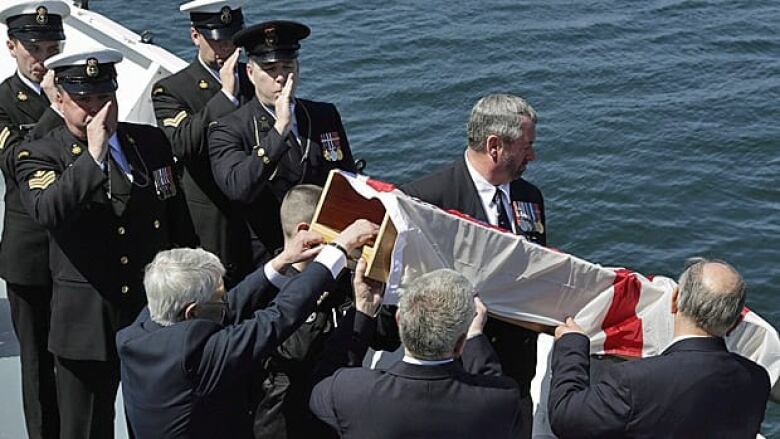Conservatives' interest in Canadian history raises eyebrows
Critics accuse heritage committee of wanting to revise the past

The House of Commons heritage committee has launched astudy of howhistory is preserved in federal, provincial and municipal programs,and how easily Canadians can access historical information.
However, it backed down from a plan to examine how history is taught in schools after a barrage of complaints from the opposition, which had accused the government of intruding on provincial jurisdiction, which includesschool curriculum development, and of wanting to revise history in its own image.
The committee beganhearing from witnesses for its history study on Monday.
The Conservative-dominated committee, which went behind closed doorslast week April 29to discussthe motion to conduct the study, said it would also "undertake a thorough and comprehensive review" of what it called "significant aspects in Canadian history." The committeewantsto hear from people who have first-hand accounts of significant historical periods. It will also invite the CBC, the National Film Board and other broadcasters to discuss their role in promoting Canadian history.
There will be a focus on events such as the Battle of Vimy Ridge, the Battle of Ortona, the Battle of the Atlantic, the Korean conflict as well as peacekeeping missions, the suffragette movement, constitutional development, the Afghanistan conflict, and Canada since the early 20th century.
'This is interference, pure and simple'
Raymond Ct, an NDP MP, said in the House of Commons last week, "That has nothing to do with promoting Canadian history. That is interference, pure and simple. The former Reformers now want to control everything. What is the world coming to?"
Bloc Qubcois MP AndrBellevance said, "This flagrant intrusion in a jurisdiction that belongs exclusively to Quebec is right in line with the Conservatives' desire to impose new Canadian symbolsmilitary ones, especially even if it means rewriting history."
After the uproar about possible interference in the provinces' jurisdiction over education, the committee, including the Conservative majority, voted Monday to remove the most controversial line of the motion that dealt with a study of history programs in primary and post-secondary institutions in each of the provinces and territories.
However, another motion, from the NDP, which demanded the committee immediately halt its study on Canadian history, was defeated.
The landing in Sicily
The committee's first witness Monday was Steve Gregory, who described himself as "a business guy from Montreal." Gregory told the committee he was surprised to find little information for his 11-year-old son's school projectabout Canadians' participation in the beach landing in Sicily during the Second World War.
Over 500 Canadians died during the four-week Sicilian campaign, which was part of the liberation of Italy, but even the museum in Catania, Sicily dedicatedto the Allied landing on the southern coast of Sicily on July 10, 1943 makes no mention of Canadians, Gregory said.
His voice breaking as he described how Canadian soldiers gave their rations to starving Italian citizens, Gregory, the head of a civilian project called Operation Husky 2013, is planning to lead a group of Canadians to Sicily this summer to erect a monument and grave markers for the Canadians who are buried there.
Speaking to reporters Sunday in Quebec City at a commemoration of the 70th anniversaryof the Battle of the Atlantic, Veterans Affairs Minister Steven Blaney, when asked if his government was trying to associate itself with the country's military past, said, "I would remind you that the [Canadian] War Museum was built under the Liberal government."
Blaney continued that there's nothing wrong with the way history is taught in schools, but wondered if Canadians actually knew how many soldiers participated in the Korean conflict and how many ships were sunk by Germans during the Second World War.
The Battle of the Atlantic was also commemorated in Ottawa on Sunday. Asked whether Canadians knew a lot about the battle at sea during the Second World War, Vice-Admiral Paul Maddison, thecommander of the Royal Canadian Navy,said he thinks Canadians are becoming more aware of the Battle of the Atlantic every year, which he described as the Navy's "Vimy" in terms of importance.
However, Maddison said, "I think our provincial educators might put a little more emphasis on celebrating what the sacrifice of our men and women in uniform and especially what their families meant to them as well."
Senator Colin Kenny, former chair of the Senate national security and defence committee, and the only Liberal politician invited to the ceremony Sunday, pointed out that the government did not celebrate the 30th anniversary of the Charter of Rights and Freedoms last year.
Asked if the Conservatives tended to favour promoting military events, Kenny said, "It might say that you're in favour of a robust military, but they've been cutting military spending, so there's a bit of a mixed message here."












_(720p).jpg)


 OFFICIAL HD MUSIC VIDEO.jpg)
.jpg)



























































































